Eagle Nest Lookout
Hidden location
We found a campsite near the water away from the road and its secluded with trees. Stayed for a week there
The southeastern Virginia landscape surrounding Wakefield offers camping options within a short drive, particularly along the James and Chickahominy Rivers. Chippokes State Park Campground, located in Surry about 20 miles southeast of Wakefield, provides tent sites, RV hookups, cabins, and yurts in a historic plantation setting. Isle of Wight Family Campground in Windsor offers year-round accommodations with full hookups for RVs and tent camping areas. The region sits within Virginia's coastal plain, characterized by gentle terrain, mature forests, and multiple waterways that create opportunities for fishing, paddling, and wildlife viewing.
Most campgrounds in the area operate seasonally, with Chippokes State Park open from late March through early December. Summer humidity and temperatures regularly exceed 90°F, making spring and fall the most comfortable camping seasons. Reservations are strongly recommended, especially for weekend stays between Memorial Day and Labor Day. "We found it ideal as a base camp to explore the tidewater area of Virginia," notes one visitor to a nearby RV park. Ticks and mosquitoes can be prevalent in warmer months, particularly in wooded areas, so insect protection is essential. Cell service varies throughout the region but remains generally reliable at established campgrounds.
Waterfront sites at Chickahominy Riverfront Park receive consistently positive reviews for their river views and cooling breezes. "The park is against the James river and there's easy access to the riverside," reports one camper about Chippokes State Park. Many campgrounds in the area serve as convenient bases for exploring the Historic Triangle of Williamsburg, Jamestown, and Yorktown. Shade availability varies significantly between campgrounds and even within the same facility. Sites along waterways tend to book quickly but offer relief from summer heat. Campers frequently mention the region's historical significance, with several parks incorporating educational components about Virginia's colonial past and plantation history into their recreational offerings.
$80 / night
"We've stayed here pretty often as it's only a few hours from home and near everything in Williamsburg, Virginia. The park is against the James river and theres easy access to the riverside."
"Chippokes State Park is located on the grounds of an old historic plantation, actually one if the original plantations in the area dating back to the 1600’s."
"There is a nice bike/running path, (the Virginia Capital Trail-51 Miles from Jamestown to Shiplock Park) a playground, pool & splash pad, fishing pier, and group sites."
"The campground is in a great location to Colonial Williamsburg, Jamestowne, and Yorktown and is a great home base for exploring those sites. They have a modern bathhouse and a pool."
$25 - $40 / night
"You walk into the woods which is kept neat and pick a spot to set up your tent - I looove that! Fishing on the lake was a blast!"
"It is a little ways out of town in any direction bit it's very nice and quiet out here as you're surrounded by woods. They also have a fishing pond and trails on-site."
$46 - $235 / night
"The campground is very close to all Williamsburg activities. A great walking trail was right down the road."
"The historic-city of Williamsburg is very nearby. Also the traintrack and big road are wright next to the campground. Spots are correct some have a bit to much sun for us (there are parasols provided)"
$35 - $40 / night
"Largest State Park in Virginia - nearly 8,000 acres. We stayed two nights and paddled around Swift Creek Lake on Sunday. The staff was amazing."
"Playground was decent and pretty centrally located on the campground. Firewood for sale by QR code was convenient. The trails were nice and it was a nice walk to the aquatic recreation park."
"The sites are quiet, very spacious, nicely spaced, some surprisingly so, but many are deceptively unlevel, particularly on the outside of the loops, and are heavily wooded."
"A bit of a long walk to the bathroom, as we need to walk around the entire loop to get to it. Gorgeous, spacious sites with electric and water at each site. Some sites back up to the St."
"Our site was pull through, not sure how we would get through if there was a full campground, luckily we had room to move around. Your very close to Busch Gardens, Watercountry and Williamsburg."
"We chose one without a bathroom, and the bathhouse was a very short walk. They have plenty of recreational activities for the kids. The staff was friendly and helpful."
"Perfect location right off of I-95. Spot we had was spacious and easy to get in and out of. I arrived after hours, but had my reservation hanging on the wall for me."
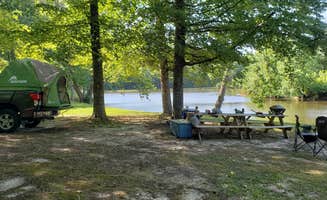
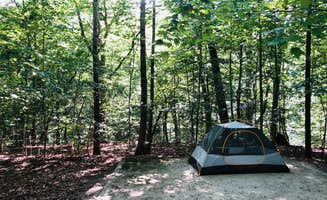
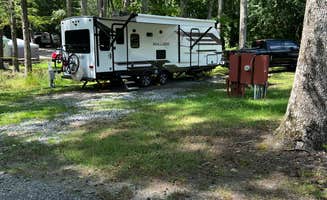
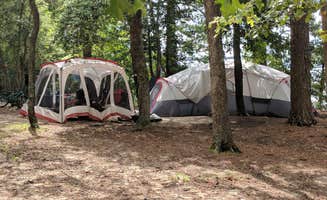
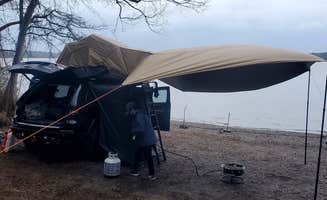
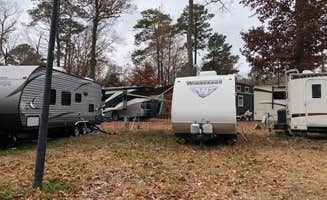
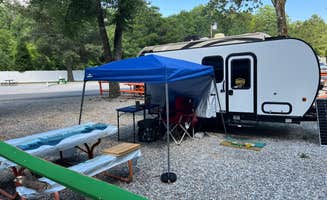
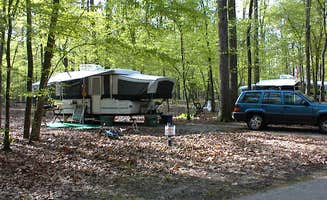
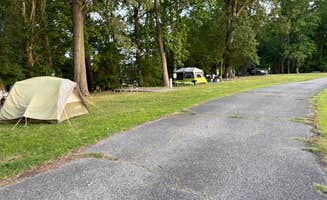
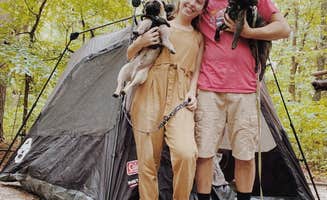
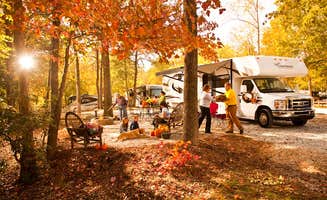
We found a campsite near the water away from the road and its secluded with trees. Stayed for a week there
we love this park they have a playground and stuff to do but we were on auto pay and they tried to charge us more than they were supposed to
People are very friendly and helpful. I do wish they would escort to site
We came in late after dark and wanted to get to Eagles Landing Lookout, but decided just to pull in here. Plenty of room for several vehicles. We saw one deer hunter. No amenities. Very quiet, and dark. Will take a look around in the morning
Parked overnight in designated parking area. No motorized vehicles beyond signs. Nice trails, with mature mixed hardwoods and conifers. We were there in deer hunting season so remember to wear blaze orange or pink. Very dark and quiet. Good gravel road with mowed shoulders to get there, and a one lane bridge, with a 40 ton weight limit. No amenities. Good t-mobile coverage. Fires allowed, but no cleared fire ring.
More of a small boating/fishing area locals usually party at than much of a campground. There's a couple more conventional pull outs before it and I stayed at one which was relatively peaceful besides someone going birdshooting with their incredibly panicked dog nearby and someone running their generator incredibly early in the morning. No amenities and lots of trash. Ended up picking up a great deal for some piece of mind.
Just like a koa, pool ( not open in Nov.), jump pad, ice cream store, on water, . A plus there are 4 sites with dog enclosure gates . Lots of dirt roads to ride bikes for toddlers
Pocahontas is about 10 mi from our house and we went to break in a new camper. Have to say that we will 100% be back. Had a great time, very organized camp and fantastic facilities.
the poeple there were so kind and my fav game in the game room was pool so nice and relaxing the train was AMAZING i loved it.
Campsites near Wakefield, Virginia offer access to marshlands, tidal rivers, and inland forests with elevation changes rarely exceeding 100 feet. Spring camping season typically begins in late March with daytime temperatures averaging 60-70°F, while fall camping extends through early December with similar moderate temperatures. Camping options within 30-45 minutes of Wakefield include both county and state park facilities with varying levels of amenities.
Kayaking through marshlands: At Chippokes State Park Campground, paddlers can explore tidal areas with protected waterways. "Definitely recommend following the river inland and kayaking through the marshland," notes Christina, who found the park ideal for water exploration.
Historical sites exploration: The region contains multiple preserved historic properties within short drives of camping areas. "This hidden gem is just a short distance from Williamsburg but yet so remote! The still working farm and homes are a treasure of how life and farms ran back in the day," writes Rose H. about Chippokes Plantation's educational value.
Hunting for fossils: Beach areas along the James River contain prehistoric treasures accessible to patient searchers. "Hunt for sharks teeth on the beach," suggests Danielle H. who visited Newport News Park, noting the unique archaeological opportunities along shorelines.
Capital Trail biking: The paved Virginia Capital Trail runs near several campgrounds, offering long-distance cycling without vehicle traffic. "Nice park along the river with activities for those with families. Kayaking, Virginia Capital Trail, and pool," reports Ruben S. who camped at Chickahominy Riverfront Park.
Water access sites: Riverside campsites provide both recreation and natural cooling during warm months. "Spacious campsite with amazing views. Could take kayaks straight into the water from our site," reports Liz M. about Chickahominy Riverfront Park's waterfront camping options.
Shaded, wooded sites: Summer heat mitigation comes from mature tree cover at most established campgrounds. "Peaceful park filled with plenty of tall trees to stay cool during the summer months... temps at our site averaged about 5-10 degrees cooler than outside the park," notes Geored1 about Newport News Park.
Fishing opportunities: Multiple bodies of water offer varied fishing environments for different skill levels. "There is a dock down by the boat ramp. It says no fishing. Wait until dark and ignore the sign. There's a light down there that draws the insects. The fish are everywhere," shares Patrick R. about an insider tip at Chickahominy Riverfront Park.
Pool access: Several campgrounds maintain swimming pools for when natural water isn't suitable. At Isle of Wight Family Campground, "They have on-site bathrooms/showers as well as laundry... a dog park area, playground and pool," reports S L., noting the recreational amenities available beyond natural features.
Train noise considerations: Some camping areas experience significant railroad disruptions. "Train is so close that it shakes our RV," mentions Heather S., describing conditions at one Williamsburg-area campground.
Variable site leveling: Many campgrounds feature uneven terrain that requires preparation. "The campsites on the A loop are a little more on an angle, they converted tent site lots to camper lots so they come with a level tent area as well," notes Johnathan M. about Pocahontas State Park Campground.
Limited tent camping spaces: Designated primitive tent sites are less common than RV facilities in this region. "They have two tent sites that have power the rest are premiative," notes Scott S. about Isle of Wight Family Campground, highlighting the need for advance planning for tent campers.
Spotty cell service: Coverage varies significantly between campgrounds and even within the same property. "AT&T had 2 bars and 6 MB/s w/o a booster, 3 bars and 8 MB/s with it. There is no satellite coverage due to the heavy tree canopy," reports Ray & Terri F. about Newport News Park's connectivity limitations.
Pool temperature timing: Families with young children should note pool conditions vary throughout the season. "Pool is very clean," notes Danielle H., though other visitors mention temperature challenges in spring and fall when pools remain open but water temperatures drop significantly.
Shower facility quality: Bathroom amenities vary greatly between campgrounds. "The bathrooms and showers are kept clean and the showers are huge!" notes Philip S. about camping at Chippokes State Park, information particularly relevant for families with young children requiring shower assistance.
Ferry ride opportunities: The Jamestown-Scotland ferry provides free water transportation and entertainment value for children. "About 5 miles away is the ferry to Williamsburg...its free and usually a highlight of the trip for the kids!" shares a camper about the transportation option accessible from campsites near Surry.
Off-season camping benefits: Camping outside peak summer months offers reduced crowd levels while maintaining access to most attractions. "We found it ideal as a base camp to explore the tidewater area of Virginia," mentions a visitor about camping during shoulder seasons when temperatures remain comfortable for outdoor activities.
Variable hookup configurations: Different camping areas offer inconsistent utility setups. "They have full hookup 30 amp 50 amp fresh water dump station sewage hookup," reports Austin H. about Riverside Camp & Marina, noting the need to verify specific utility arrangements when booking.
Site size considerations: Many camping areas have limited space between sites despite tree coverage. "Large campsites. Well maintained. Got last available site & never felt crowded," shares John M. about Chippokes State Park Campground's spatial arrangements.
Leveling requirements: Bring equipment to handle terrain variations common throughout the region. "Make sure you have leveling chalks as some of the sites are too uneven for auto leveling to work," advises Tanya R., noting that "some of the sites are hit or miss when it comes to bare dirt, grass, mossyness, leaf/pine covered grounds."
Proximity to supply options: Most camping areas require 15-20 minute drives to reach grocery or hardware stores. "About 20 miles away is every store you can imagine, but super quiet at night," reports Ashley I. about Pocahontas State Park Campground's balance of convenience and solitude.
Frequently Asked Questions
Where is the Wakefield campground located and how do I get there?
Wakefield is located in southeastern Virginia, with several campgrounds in the vicinity. Chippokes State Park Campground is situated against the James River and provides easy access to attractions in Williamsburg. The area is well-positioned in Virginia's tidewater region, making it a convenient base for exploring coastal destinations. Campgrounds in this area are typically accessible via Interstate 64, which connects Richmond, Williamsburg, and Virginia Beach. Local roads lead to specific campgrounds, though some may require navigation through smaller country roads.
What amenities are available at the Wakefield campground?
Chickahominy Riverfront Park offers a range of amenities including level sites with sandy gravel, moveable picnic tables, metal fire pits with cooking grates, and shady spots. The park provides wood and ice for sale, access to the Virginia Capital Bike Trail, and activities like kayaking. Pocahontas State Park Campground features clean bathhouses with separate shower facilities, a camp store selling ice, drinks, snacks, souvenirs, and firewood. Many campgrounds in the Wakefield area offer full hookup sites for RVs, water access, and basic facilities for tent campers.
When is the best time of year to camp at Wakefield campground?
Late spring through early fall is generally the best time to camp in the Wakefield area. Machicomoco State Park Campground showcases Virginia's natural beauty during these seasons when the waterfront location on the York River can be fully enjoyed. The Colonies RV and Travel Park is particularly pleasant in summer months when visitors can take advantage of nearby beaches and ocean breezes. Summer brings warmer temperatures ideal for water activities, while spring and fall offer milder weather and fewer crowds. Winter camping is possible but facilities may be limited and weather less predictable.
Keep Exploring